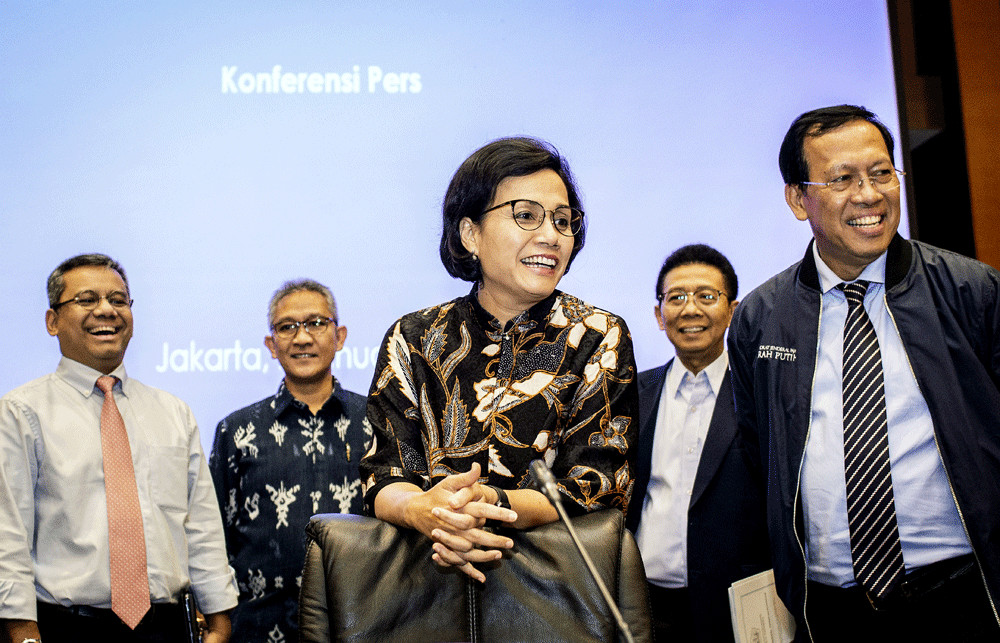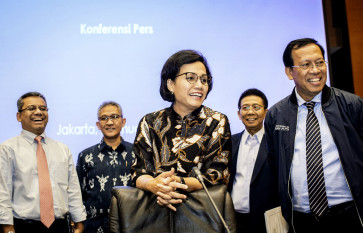Popular Reads
Top Results
Can't find what you're looking for?
View all search resultsPopular Reads
Top Results
Can't find what you're looking for?
View all search resultsDecentralization and fiscal accountability
Change text size
Gift Premium Articles
to Anyone
 Finance Minister Sri Mulyani Indrawati (center), accompanied by the ministry’s taxation director general, Robert Pakpahan (right), treasury director general Marwanto Harjowiryono (second right), Fiscal Policy Agency head Suahasil Nazara (left) and budget director general Askolani, interacts with the press before a briefing on the 2018 state budget in Jakarta. (Antara/Aprillio Akbar)
Finance Minister Sri Mulyani Indrawati (center), accompanied by the ministry’s taxation director general, Robert Pakpahan (right), treasury director general Marwanto Harjowiryono (second right), Fiscal Policy Agency head Suahasil Nazara (left) and budget director general Askolani, interacts with the press before a briefing on the 2018 state budget in Jakarta. (Antara/Aprillio Akbar)
I
ndonesia is experiencing a decentralization process through the Big Bang approach. Without the significant prior experience in decentralizing and only around two years of preparations after the Reform Era started in 1998, Indonesia successfully transformed from one of the most centralized countries in the world to one of the most decentralized ones.
Regional autonomy and fiscal decentralization started in May 2001 after two laws were completed in June 1999, namely Law No. 22/1999 on regional governments (which was later amended twice in 2004 and 2014) and Law No. 25/1999 on fiscal balancing (amended in 2004).
Decentralization in Indonesia embodies three aspects: politics, administration and fiscal. This article will focus more on fiscal decentralization. Indonesia’s fiscal decentralization was underpinned by three pillars: revenue assignments to regions, expenditure assignments to regions and intergovernmental fiscal transfers to regions. To fulfill their own needs, regional governments were given the authority by the central government to gather their sources of revenue.
This is mentioned in Law No. 28/2008 on local taxes and retribution. With regard to their spending assignment, local governments were given the authority to decide what they want to spend their money on. As resources — especially money — are limited, local governments must set their priorities.
According to 2018 data, on average, revenue collected from the subnational governments can only account for around 25 percent of their total revenue. The remaining 75 percent comes from the central government. In other words, local governments still heavily depend on the transfers from the central government to meet their needs. From the perspective of the central government, for instance, transfers to regions and village funds account for 33.59 percent of the 2019 state budget.
For optimal results, there needs to be transparency and accountability in the transferring of such large amounts from the state budget to local governments. In Indonesia, accountability and transparency, both in central and local government levels, still need to be improved. The central government is already quite accountable and transparent in terms of allocating money to regions and village funds as nearly all the allocations are based on a defined formula and parameters.
However, this does not mean that the system is free of moral hazards. The arrest of one government official and one member of the House of Representative by the Corruption Eradication Commission (KPK) last year proved that accountability and transparency in that area still have room for improvement. As for local governments, the executor of public services that know the most about local needs, they need to improve their accountability and transparency.

















